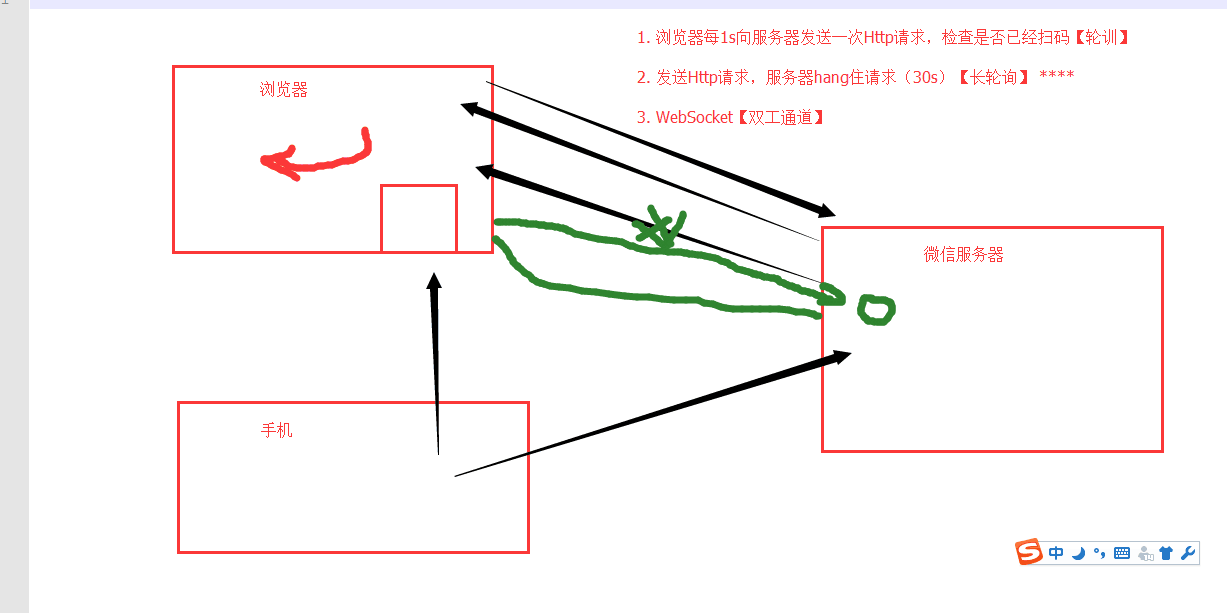day36 爬虫+http请求+高性能
爬虫
参考博客:http://www.cnblogs.com/wupeiqi/articles/5354900.html
http://www.cnblogs.com/wupeiqi/articles/6283017.html
- 基本操作
概要:
- 发送Http请求,Python Http请求,requests
- 提取指定信息,Python 正则表达式,beautifulsoup
- 数据持久化,
Python两个模块
- requests
- beautifulsoup
Http请求相关知识
- 请求:
请求头:
- cookie
请求体:
- 发送内容
- 响应:
响应头
- 浏览器读取
响应体
- 看到的内容
特殊:
- cookie
- csrftoken
- content-type:
content-type:application/url-form....
name=alex&age=18
content-type:application/json
{name:'alex',age:18}
- 性能相关
- 串行: 1个人,一个任务一个任务,空余时间,玩。
- 线程: 10个人,一个任务一个任务,空余时间,玩。
- 进程: 10个家庭,一个任务一个任务,空余时间,玩。
- 【协程】异步非阻塞:1个人,充分利用时间。
- scrapy框架
- 规则
- redis-scrapy组件
内容详细:
- 基本操作,python伪造浏览器发送请求并或者指定内容
pip3 install requests
response = requests.get('http://www.baidu.com')
response.text
pip3 install beautifulsoup4
from bs4 import Beautifulsoup
soup = Beautifulsoup(response.text,'html.parser')
soup.find(name='h3',attrs={'class':'t'})
soup.find_all(name='h3')
示例:爬取汽车之家新闻
- 模块
requests
GET:
requests.get(url="http://www.oldboyedu.com")
# data="http GET / http1.1\r\nhost:oldboyedu.com\r\n....\r\n\r\n"
requests.get(url="http://www.oldboyedu.com/index.html?p=1")
# data="http GET /index.html?p=1 http1.1\r\nhost:oldboyedu.com\r\n....\r\n\r\n"
requests.get(url="http://www.oldboyedu.com/index.html",params={'p':1})
# data="http GET /index.html?p=1 http1.1\r\nhost:oldboyedu.com\r\n....\r\n\r\n"
POST:
requests.post(url="http://www.oldboyedu.com",data={'name':'alex','age':18}) # 默认请求头:url-formend....
data="http POST / http1.1\r\nhost:oldboyedu.com\r\n....\r\n\r\nname=alex&age=18"
requests.post(url="http://www.oldboyedu.com",json={'name':'alex','age':18}) # 默认请求头:application/json
data="http POST / http1.1\r\nhost:oldboyedu.com\r\n....\r\n\r\n{"name": "alex", "age": 18}"
requests.post(
url="http://www.oldboyedu.com",
params={'p':1},
json={'name':'alex','age':18}
) # 默认请求头:application/json
data="http POST /?p=1 http1.1\r\nhost:oldboyedu.com\r\n....\r\n\r\n{"name": "alex", "age": 18}"
补充:
request.body,永远有值
request.POST,可能没有值
beautifulsoup
soup = beautifulsoup('HTML格式字符串','html.parser')
tag = soup.find(name='div',attrs={})
tags = soup.find_all(name='div',attrs={})
tag.find('h3').text
tag.find('h3').get('属性名称')
tag.find('h3').attrs
HTTP请求:

GET请求:
data="http GET /index?page=1 http1.1\r\nhost:baidu.com\r\n....\r\n\r\n"
POST请求:
data="http POST /index?page=1 http1.1\r\nhost:baidu.com\r\n....\r\n\r\nname=alex&age=18"
socket.sendall(data)
示例【github和抽屉】:任何一个不用验证码的网站,通过代码自动登录
1. 按理说
r1 = requests.get(url='https://github.com/login')
s1 = beautifulsoup(r1.text,'html.parser')
val = s1.find(attrs={'name':'authenticity_token'}).get('value')
r2 = requests.post(
url= 'https://github.com/session',
data={
'commit': 'Sign in',
'utf8': '✓',
'authenticity_token': val,
'login':'xxxxx',
'password': 'xxxx',
}
)
r2_cookie_dict = r2.cookies.get_dict() # {'session_id':'asdfasdfksdfoiuljksdf'}
保存登录状态,查看任意URL
r3 = requests.get(
url='xxxxxxxx',
cookies=r2_cookie_dict
)
print(r3.text) # 登录成功之后,可以查看的页面
2. 不按理说
r1 = requests.get(url='https://github.com/login')
s1 = beautifulsoup(r1.text,'html.parser')
val = s1.find(attrs={'name':'authenticity_token'}).get('value')
# cookie返回给你
r1_cookie_dict = r1.cookies.get_dict()
r2 = requests.post(
url= 'https://github.com/session',
data={
'commit': 'Sign in',
'utf8': '✓',
'authenticity_token': val,
'login':'xxxxx',
'password': 'xxxx',
},
cookies=r1_cookie_dict
)
# 授权
r2_cookie_dict = r2.cookies.get_dict() # {}
保存登录状态,查看任意URL
r3 = requests.get(
url='xxxxxxxx',
cookies=r1_cookie_dict
)
print(r3.text) # 登录成功之后,可以查看的页面
- requests
"""
1. method
2. url
3. params
4. data
5. json
6. headers
7. cookies
8. files
9. auth
10. timeout
11. allow_redirects
12. proxies
13. stream
14. cert
================ session,保存请求相关信息(不推荐)===================
import requests
session = requests.Session()
i1 = session.get(url="http://dig.chouti.com/help/service")
i2 = session.post(
url="http://dig.chouti.com/login",
data={
'phone': "8615131255089",
'password': "xxooxxoo",
'oneMonth': ""
}
)
i3 = session.post(
url="http://dig.chouti.com/link/vote?linksId=8589523"
)
print(i3.text)
"""
- beautifulsoup
- find()
- find_all()
- get()
- attrs
- text
内容:
1. 示例:汽车之家
2. 示例:github和chouti
3. requests和beautifulsoup
4. 轮询和长轮询
5. Django
request.POST
request.body
# content-type:xxxx
作业:web微信
功能:
1. 二维码显示
2. 长轮询:check_login
3.
- 检测是否已经扫码
- 扫码之后201,头像: base64:.....
- 点击确认200,response.text redirect_ur=....
4. 可选,获取最近联系人信息
安装:
twsited
scrapy框架
课堂代码:https://github.com/liyongsan/git_class/tree/master/day36




【推荐】编程新体验,更懂你的AI,立即体验豆包MarsCode编程助手
【推荐】凌霞软件回馈社区,博客园 & 1Panel & Halo 联合会员上线
【推荐】抖音旗下AI助手豆包,你的智能百科全书,全免费不限次数
【推荐】博客园社区专享云产品让利特惠,阿里云新客6.5折上折
【推荐】轻量又高性能的 SSH 工具 IShell:AI 加持,快人一步